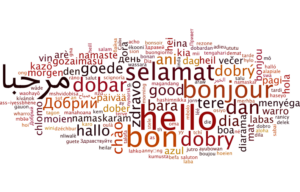Future of Languages Around World
By Polina Anastassieva
Russian schools may introduce the study of Arabic and include it in the Unified State Examination.
The head of Rosobrnadzor, Anzor Muzaev, said that the agency, together with the Ministry of Education, launched “the process of monitoring the demand for the Arabic language.” Officials are studying which schools and regions have requests to study this language, and which Russian universities are already training Arabic teachers (programs are open in five universities).
As an example, Muzaev demonstrated the “road map” for the introduction of the Chinese language – the process of including it in the Unified State Exam took five years. The same time frame, according to the official, could be taken by introducing Arabic into the educational process.
During the exchange of visits between the ministers of education of the Russian Federation and the UAE, the issue of studying Russian there, and Arabic in Russia, was raised, not only in universities, but also in schools. Muzaev emphasized that the appearance of Arabic in schools and passing it in the form of the Unified State Exam are possible only after the development of a federal state standard, testing of textbooks and the availability of teachers.
Muzaev is confident that learning Arabic is especially important in rural areas – in some villages and auls “children will never use English.” Any language is mastered well when children understand where they can use it. There are mosques there, there are madrassas and a more understandable story for them, where they can apply it.
The first deputy chairman of the Spiritual Administration of Muslims, Damir Mukhetdinov, said that Russian society has a historic opportunity – “to introduce the Arabic language into our schools once and for all, so that Muslims have a choice.
The theologian also noted that earlier imams could not even imagine that “our dignitaries would seriously put the study of Arabic in schools on the agenda.”
The Unified State Exam (USE) was introduced in Russia in 2001 and is managed and regulated by The Federal Service for Supervision in Education and Science jointly with the local public education authorities of the regions of Russia.
The USE is an exam in the Russian Federation that every student needs to pass after graduation from school in order to get into a University or a Professional College. The Unified State Exams are generally held during the month of May-June and there are 14 general subjects to study.
To get a diploma, it is mandatory to pass the USE compulsory subjects – Russian language and Mathematics. The students can take two additional subject exams in Foreign languages – English, German, French, Spanish; Physics, Chemistry, Biology, Geography, Literature, History and Introduction to social sciences and computing sciences.
There are a variety of factors including economic, cultural, political, and social that would potentially create a stronger bond between Russia and the Middle East. Around the world, these are still two of the top hardest languages to learn. Yet, in the West, the focus has been on languages such as French, German, and Spanish. This will certainly lead to a shift in how and in what language business is conducted in that part of the world.
Photo by linguisticsociety.org
Polina Anastassieva, is a compliance, fraud prevention and detection, and risk management analyst, as well as an international business consultant. Polina is also an entrepreneur and a writer, her blog, specifically focuses on understanding international topics such as trade, culture, foreign affairs, and conducting business around the globe. She has also been featured on St. Edward’s University‘s alumni website, as a distinguished member and supporter for the community. Additionally, she is on the board of World Affairs Council of Austin. #ArabicLanguage #RussianLanguage


Leave A Comment